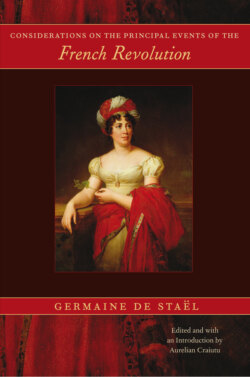Читать книгу Considerations on the Principal Events of the French Revolution - Germaine de Stael - Страница 31
На сайте Литреса книга снята с продажи.
ОглавлениеCHAPTER XIX
Means Possessed by the Crown in 1789 of Opposing the Revolution.
The true public opinion, which rises superior to faction, has been the same in France for twenty-seven years; and every other direction given to it, being artificial, could have only a temporary influence.
There was at this time no intention of overturning the throne, but a decided determination that laws should not be passed by those who were to execute them; for it was not in the hands of the King, but of his ministers, that the authority of the former arbitrary governments was vested. The French did not, at that time, willingly submit to the singular humility which they are at present required to practice—that of believing themselves unworthy of exercising, like the English, an influence on their own fate.1
What objection could be made to this, the almost unanimous wish of France, and to what length ought a conscientious king carry his refusal? Why take on himself alone the responsibility of government, and why should not the information that would accrue to him from an assembly of deputies, composed like the English parliament, be of equal avail to him, as that which he derived from his council or his court? Why substitute for the mutual duties of subject and sovereign, the revived theory of the Jews on divine right? Without at present entering into a discussion, it cannot be denied at least that force is necessary to maintain that theory, and that “divine right” requires a human army to make it manifest to the incredulous. And what were at that time the means of which the royal authority could avail itself?
There seemed only two courses to follow—to triumph over public opinion or to enter into treaty with it. Force! force! is the cry of those men who imagine that they acquire it by pronouncing this word. But in what consists the force of a sovereign unless in the obedience of his troops? Now the army, so early as 1789, was, in a great measure, attached to the popular opinion, against which, on this supposition, it would have had to act. It had hardly been engaged in the field for twenty-five years; it was thus an army of citizens imbrued with the feelings of the nation and proud of being associated with it. Had the King, say some, put himself at its head, he would have carried it along with him. The King had not received a military education, and all the ministers in the world, without excepting such a man as Cardinal Richelieu, are incapable of supplying, in this respect, the personal agency of a monarch. Others may write for him, but they cannot command an army in his stead, particularly when it is to be employed in the interior. Royalty cannot be performed, like certain theatrical exhibitions, where one actor does the gestures while another pronounces the words. Had even the most decided character of modern times, Bonaparte himself, been on the throne, his will would have failed in the contest with popular opinion at the time of the opening of the Estates General. Politics were then a new field for the imagination of Frenchmen; everyone flattered himself with acting a part, everyone saw a personal object in the chances opening in all directions. The course of events, and the spirit of literary publications, for a century back, had prepared the mind of the nation for countless advantages which it thought itself ready to seize.2 When Napoléon established despotism in France, circumstances were favorable to such a plan; the public was weary of trouble, awed by the remembrance of dreadful misfortunes, and apprehensive of their return by a revival of faction. Besides, the public ardor was turned toward military fame; the war of the Revolution had raised the national pride. Under Louis XVI, on the contrary, the current of public opinion was directed to objects purely philosophical; it had been formed by books, which proposed a number of improvements in the administration of justice and other branches of civil government. The nation had long enjoyed profound peace, and war had been, in a manner, out of fashion since the time of Louis XIV. All the activity of the popular mind pointed to a desire of exercising political rights, and all the skill of a statesman consisted in the art of dealing tactfully with this opinion.
So long as it is practicable to govern a country by military force, the task of ministers is easy, and great talents are not necessary to ensure obedience; but if, unfortunately, recourse be had to force, and it fails, the other resource, that of winning the public opinion, is no longer available; it is lost forever from the time that an attempt was made to constrain it. Let us examine on this principle the plans proposed by M. Necker, and those which the King was persuaded to adopt in sacrificing this minister.
